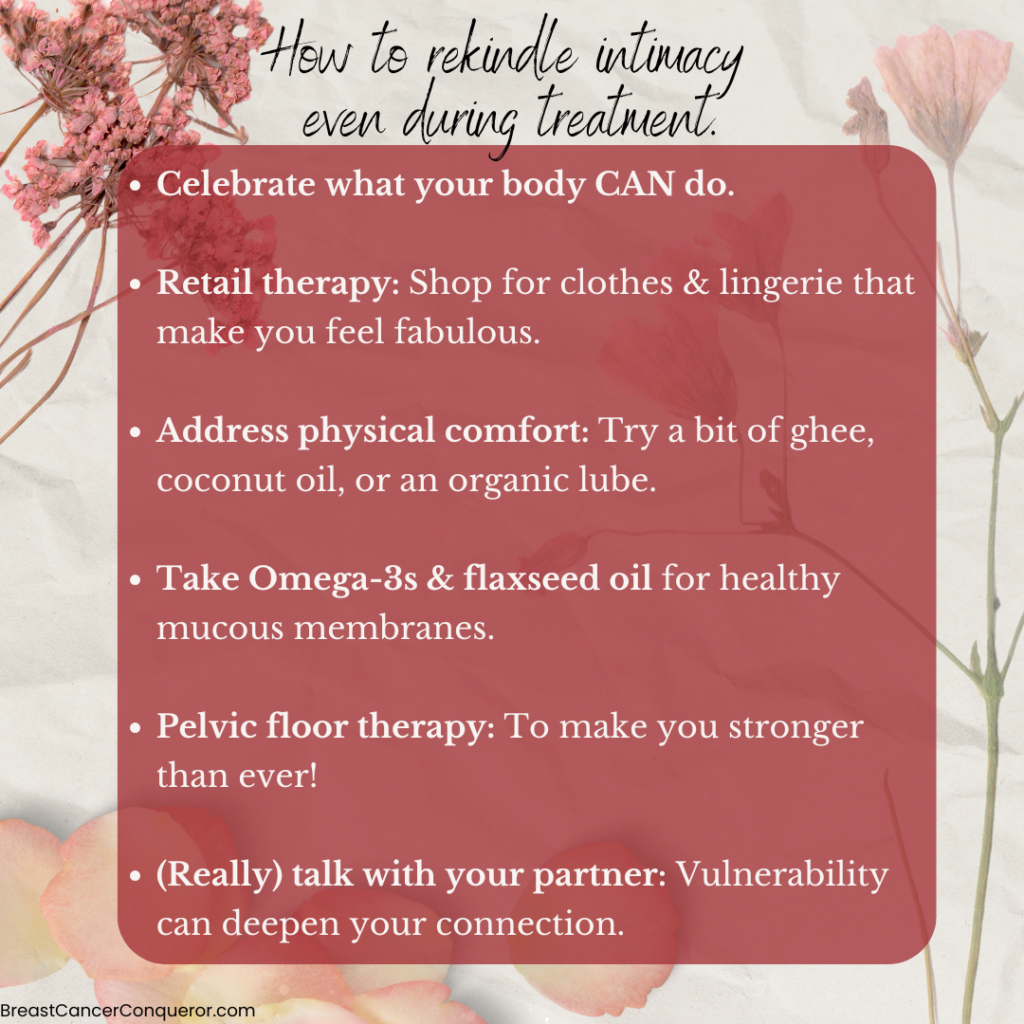
Quick Read:
- Wonderful sex during cancer treatments is possible and even fantastic for your healing as it boosts mood, immune system, and connection with your partner.
- Breast cancer treatments—including surgery, chemotherapy, radiation, and hormonal therapies—can cause significant physical changes that affect sexual health.
- The challenges are real, but so are the solutions and opportunities for growth, connection, and making intimacy even better!
You are an ocean, every day of your beautiful life, or “Bru-tiful” (brutal + beautiful, as Glennon Doyle coined), is filled with ebbs and flows, consistent changes. You, like nature, are evolving, shifting, and changing throughout every season.
The same goes for your sex life.
Remember back to your perhaps wild puberty years and reckless 20s that were spurred on by wildly impulsive hormones? Fast forward to now or the near future of embarking on a journey into the valley of no more estrogen or the more medical term: menopause. All of the above impact your sexual wellness and being, and now you are adding cancer and treatments to this weirdly confusing journey.
To make it all even more bewildering, you may need to push through shame, stigma, silencing, and trauma. Many of us suffer from a severe lack of education about our reproductive health, how our body works, and how to talk about anything related to sex and intimacy with our partners.
So before we begin, take deep, cleansing breaths while hugging yourself. Repeat.
It’s time to let go and grow.
First, this article will go through the physical changes and complications brought on by cancer and different treatments. Often, just naming an issue and knowing why it’s causing your body to change can help with coping. Next, solutions for physical, mental, and emotional support will be shared because we are complex beings of energy, not just skin and bones.
The goal is to provide insight, comfort, and support so that you can rediscover yourself, your relationship, and your spouse (if applicable). Your healing journey can be an opportunity to deepen emotional connections and uncover more of what makes a relationship thrive, making it stronger and more connected than ever before.

Physical Changes & Their Impact on Intimacy
Breast cancer treatments—including surgery, chemotherapy, radiation, and hormonal therapies—can cause significant physical changes that affect sexual health. These changes often influence both desire and comfort, creating new challenges in the sheets. Let’s explore.
Surgical Scars (aka: badges of courage and resilience!)
Mastectomies or lumpectomies can lead to physical scars and changes in how your boobs now look. It’s totally fine to grieve what happened to you, but it’s also proof that you can—and DID—handle a brutal challenge like the queen you are!
Surgery also means it’s time for retail therapy, so get shopping with this guide from Dr. V! Lastly, if you are considering breast implants and or fat transfers, please read this blog post for insight and guidance.
Hormones
Balanced hormones are needed for healthy brains, bones, immune systems, and cardiac health—they’re essential to healthy functioning bodies. However, toxic hormones, treatments, and menopause can leave you feeling like you’ve been stranded in the Mojave Desert or even Death (of your sex life) Valley.
- Chemotherapy drugs such as cyclophosphamide, methotrexate, 5 fluorouracil, and Taxol (Paclitaxel) can cause your body to go into “medically induced menopause,” and this loss of ovarian function could lead to vaginal pain and dryness, hot flashes, and intense fatigue. All of which may cause your libido to run far away from the bedroom. If you are going through chemo or it’s naturally time for your body to climb aboard S.S. Menopause, please read this blog post.
- Aromatase inhibitors drastically lower estrogen levels, and consequentially low estrogen = low libido and vaginal dryness and no sparks flying. To learn more about AIs, please read this blog post.
- Xenoestrogens are toxic estrogens found in tap water, non-organic meat and produce, plastics, beauty products, etc., that sneak into your body and take up vital space in the body’s mammary tissue estrogen receptor sites. These potent chemicals are powerfully dangerous, and research has found high levels in many breast cancer tumors. This is because they masquerade as hormones in your body and wreak havoc on hormonal balance, which can lead to breast cancer and a wide array of dis-eases. Even more, xenoestrogens can spike stress hormones, which drop “feel-good hormones” like dopamine, serotonin, and oxytocin. To learn more about Xenoestrogens, please listen to this podcast episode and read this blog post.
Fatigue & Stress
You are just too tired. Even without undergoing intense fatigue-inducing treatments, running kids around, prepping for big meetings, and managing general life is exhausting and stressful. And now you have to do your life on top of what seems like endless appointments and therapies. You just want to sleep—for days—but you can’t because of the insomnia monster. Give yourself a break and a lot of grace.
Lymphedema
Lymphedema is swelling of certain parts of the body caused by lymph fluid not flowing properly. It is common in the arms and sometimes the abdomens of women who have had their lymph nodes removed or damaged by surgery or radiation. The pain, fatigue, and emotional stress associated with it can add to the mix to bring the mood down.
Nerve Damage & Body Changes
Treatments involving lymph node removal or radiation can sometimes cause nerve damage, reducing sensation in specific body parts. Additionally, all the change, stress, and unknowns can certainly impact your relationship with yourself, body, and spouse.
Your Breast Cancer Conqueror community wants to give you the biggest hug right now and tell you that we see you as a beautiful, brave, strong, and stunning woman. Please keep telling yourself that until you believe it!
Emotional & Mental Health Challenges
The emotional toll of breast cancer can weigh heavily on intimacy. Emotional well-being is closely tied to sexual health, and the stress, anxiety, and depression that often accompany a cancer diagnosis can dampen sexual desire and connection.
Fear of the future can certainly overshadow moments of closeness, and so can the understandable challenges of self-consciousness. Your partner may also be acting as a caregiver and feeling overwhelmed with everything else that is required of them. This time together can either make you both bitter or better…and the below will help you become better!
Solutions & Strategies for Rekindling Sex During Cancer Treatments
While the challenges are real, so are the possibilities for growth, reconnection, and making your relationship even stronger..and, dare we say, saucier?!
Here are some actionable steps to nurture intimacy during and after breast cancer treatment:
-
Talk to your partner; we mean really talk.
- Share Your Feelings: Talk openly about fears, desires, and discomfort. Vulnerability can deepen your connection.
- Seek Feedback: Ask your partner how they feel and explore ways to support each other.
-
Get physical in more ways than one.
- Physical Touch: Hold hands, cuddle, or give massages (click here to learn more) to maintain a physical connection and support healing.
- Explore new paths: Spend time together doing activities that strengthen emotional bonds. Exercise can help you feel sexy again. It pumps you with euphoric endorphins, makes you feel hot and sweaty (literally), and helps your body feel flexible and strong. Even if that’s the last thing on your mind, you will be surprised by how energy-inducing and life-giving exercise makes you feel!
-
Address Physical Comfort

- Lube it up: A dry vagina can lead to painful sex, but some water-based lube love works great in the heat of the moment. A tiny bit of ghee or organic coconut oil can also soothe vaginal tissues.
- Use Hygeena suppositories: Learn all about this amazing product for vaginal wellness via our podcast episode with Dr. Sellman and then buy here.
- Take Omega-3s and flaxseed oil: Both can help maintain healthy mucous membranes. Buy Omega-3s here and learn more about flaxseeds (also tiny but mighty healers!) here.
- Pelvic Floor Therapy: Consider consulting a physical therapist specializing in pelvic health to address discomfort and strengthen muscles. Yes, treatment can be a time to get stronger than ever!
- Adjust Positions: Explore new positions or return to trusty old ones that are comfortable and reduce strain on sensitive areas.
-
Talk to a therapist
- Therapy: Individual or couples therapy can provide a safe space with an expert to address emotional and relational challenges.
- Sexual Health Specialists: Seek advice from professionals specializing in sexual health and cancer care.
-
Rebuild Body Confidence
- Celebrate Small Wins: Focus on the body’s strength and resilience rather than perceived flaws. And not just during treatment, but do this now till forever!

- Lingerie and Clothing: Invest in lingerie or clothing that makes you feel beautiful and confident. It’s time for another retail therapy session!
- Mindfulness Practices: Techniques like meditation (our favorites) and yoga can foster a positive relationship with your body.
- Celebrate Small Wins: Focus on the body’s strength and resilience rather than perceived flaws. And not just during treatment, but do this now till forever!
Your sex, love, and intimacy are always evolving, and so are you. Flow with it, and be the big, powerful ocean of life and love that you are! With patience, compassion, and a willingness to adapt, a fulfilling sex life is entirely achievable during and after breast cancer treatment. It’s time to thrive!
